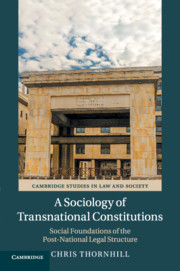Acknowledgements
Much of the research for this book was funded by a grant from the European Research Council (Advanced Grant: 323656-STC). This grant provided me with quite unique academic opportunities, and I am immensely grateful to the ERC for this support. I am also grateful to the researchers that I have been able to employ because of this grant: Carina Calabria, Jessica Carlisle, Rodrigo Cespedes, Dominic Dagbanja, Gianluca Gentili, Wim Muller, Elizabeth O'Loughlin and Maria Smirnova. Our collaboration has been both pleasurable and at times deeply enlightening.
Research for this book was conducted in many locations, in Europe, Latin America and Africa, and I would like to thank everyone who has assisted me along the way. I have often been inspired by the judges and lawyers that I have met in different societies, and I hope that my admiration for their attempts to construct solutions for the at times intensely challenging problems which they have faced is evident throughout this book. My special gratitude is due to the academic and administrative staff at the Max-Planck-Institut für europäische Rechtsgeschichte in Frankfurt am Main. Two extended stays at the Institute, a magnificent place to undertake focused academic research, enabled me to write some of the historical sections of this book.
Preliminary papers containing some of the research in this book have been presented at many seminars, lectures and conferences, and it is not possible for me to thank all the people whose commentaries and criticisms have influenced its development in such contexts. However, I received particularly stimulating feedback following research presentations at the Humboldt Universität in Berlin (May 2013), at the Johann Wolfgang Goethe Universität in Frankfurt am Main (December 2013), at Copenhagen Business School (January 2014), at Unisinos in São Leopoldo (August 2014), at the Universität Bremen (October 2014) and at the Instituto de Ciências Sociais da Universidade de Lisboa (April 2015). I would like to thank all participants in these events for their responses to my research, and I have tried to incorporate their observations at appropriate points in my analyses.
While writing this book, I had the privilege to participate in discussions with many academics of very high quality, and I would like to thank them all for such stimulating exchanges. Prominent among these are my former colleagues at Glasgow University – Chris Berry, Emilios Christodoulidis, Johan van der Walt, Adam Tomkins and Stephen White; my new colleagues at the University of Manchester – Jean d'Aspremont, Tom Gibbons, Kirsty Keywood and Robert Thomas; and my friends, Paul Blokker, Poul Kjaer, Atina Krajewska, Mikael Rask Madsen, Aldo Mascareño, William Outhwaite and Darrow Schecter. However, the research in this book has been most deeply influenced by the work and thought of Hauke Brunkhorst and Gunther Teubner, both of whom I have had the good fortune to meet regularly over the last few years, and with both of whom I have engaged in at times sharply critical debate. My admiration for their work remains immense, although the claims that I advance in this book dispute many of their assumptions and conclusions.
In addition, I owe an extremely warm debt of gratitude to Finola O'Sullivan at Cambridge University Press, who has always provided me with wonderful support and encouragement.



